With the club having celebrated its 50th year it was inevitable that members of the 1930’s were in decline. Charlie Davey, Percy Huggett and Ernie Mills were three who passed their knowledge onto younger members, timekeeping being one of their specialities. This being just one of the duties the members of the future would need to fulfil.
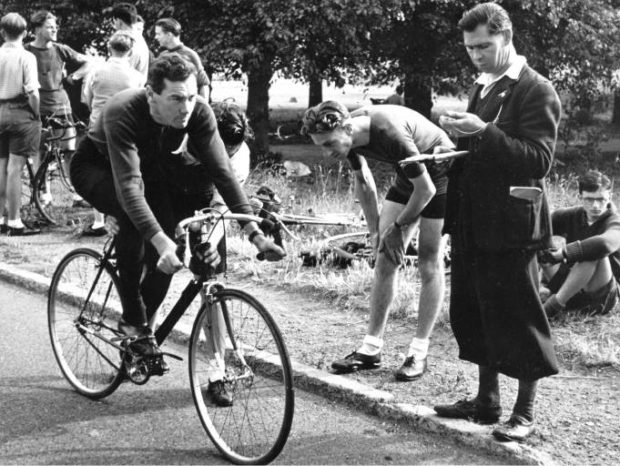
After eight years ‘of apprenticeship’ as an assistant timekeeper, in 1974 Joyce Smith had been appointed the first fully qualified woman timekeeper for RTTC London South District. She also took on timekeeping and judging duties for the BCF.
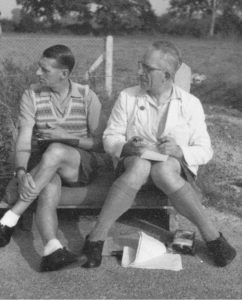
Dave Sinclair proved a great asset while with the Addiscombe. He not only ran a table tennis competition at the clubroom but also a winter training course that attracted new members. In December 1978 he organised a successful coach party to Calshott to give riders track riding experience and repeated this venture gain in 1980.
Paul Tunnell and parents Peter and Edie were relatively new members giving valuable support. Even as a junior Tunnell was a keen participant in cyclocross events and his reports indicate he was fairly consistent at writing-off wheels and frames at an early age! Paul quickly became cyclocross secretary and took on promotion of the Open 25 and cyclocross event.
In February 1979 the club welcomed another junior novice, Phil O’Connor, who by the end of the year would take the club’s junior 10 and 25 trophies, plus the senior 25-mile cup, with rides of 23.02 and 57.48. If the name strikes a cord with readers, yes, this is the same O’Connor who would go on to become a professional photographer regularly featuring in Cycling Weekly.
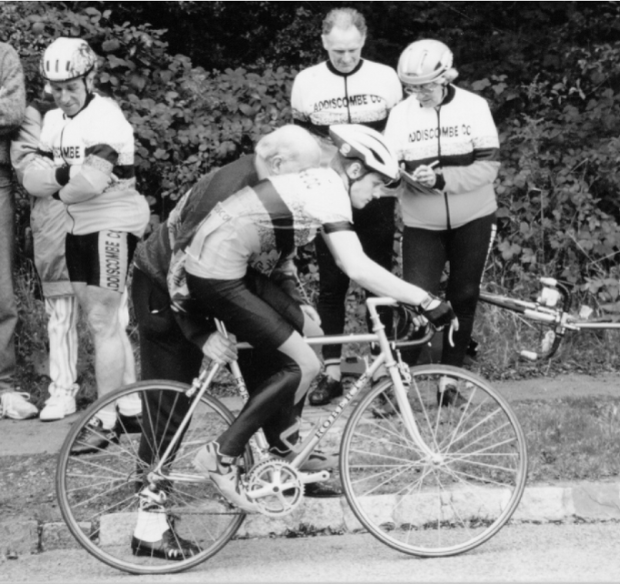
Throughout 1979 Dave Bull rode consistently well in massed start events and time trials. Early season he and schoolboy Leslie Phillips competed weekly at Eastway and he encouraged seven regulars to race at Crystal Palace. Members were also travelling further afield for events. In April Angus Litterick and John Francksen had ridden road races and a 2-up time trial in Guernsey. Early June saw Bull, Francksen, John Smith and Phil O’Connor riding at the week-long Harrogate Festival of Cycling, the brainchild of Ron Kitching – “Mr Everything Cycling”. The lads camped, raced and supported each other in events throughout the week. In total, Bull rode in five time trials and two road races, Smith, Francksen and O’Connor each road three time trials, and by the account O’Connor wrote up in the Gazette, they all enjoyed their trip even if some of the events were tough. Bull then crossed over to the Isle of Man where he met up with Glyn Durrant and Rita Parsons for yet more racing by all three. Bull achieved two 2nd placings during the year, in the Coronation road race at Brill and the BCF London Divisonship championship run off on the Lingfield circuit. In the Catford’s prestigious Brighton to London race he was placed 7th.
Time trials were well supported in 1979 by numerous members striving for personal bests and some achieving their goals. Dave Bull rode in the Border C.A. 12, his first attempt at the half-day race, and with an excellent ride of 254.383 miles finished 2nd, only just losing out to Oxford City’s Ian Dow by .327 of a mile. Aided by John Smith and Sid Honeyball they were fastest team. Honeyball chose the North Road event for his 24-hour initiation and finished 5th with 422 miles covered and the following month recorded 238 miles in the Luton 12. Phil O’Connor with 58.57, Smith 59.00 and Bull 59.23 took the end of season Eastern Counties 25 team award. Schoolboy James Wright finished 3rd in the London District Heat of the GHS championship but was unable to take up his place in the GHS Final, run off in the Midlands.
The Addiscombe’s Open events’ results were unusual in that P. L. Howard, Woolwich C.C. won all three events with the Addiscombe taking two of the team awards. Phil O’Connor, Dave Bull and Gerwyn Evans took the Open 10, and Bull, John Smith and O’Connor the Open 50. The Open 25 team award went to the Epsom C.C.
John Withey, Wandsworth C.C., had teamed up with Dave Bull and Glyn Durrant to ride in the Manx Viking Wheelers 3-up in June 1979. By the beginning of 1980 he had decided to move clubs and became a formidable force within the Addiscombe. Pat Lacey, meanwhile, had rejoined the Clarencourt C.C. but chose to stay second-claim with the Addiscombe to captain the Darts team.
Road and circuit racing, rejuvenated by Dave Bull, now brought even greater successes. John Withey, Phil O’Connor and Dave Bull started their season as early as February. By mid-March they were beginning to show some form and although O’Connor was unlucky to be brought down in the Juniors and 3rd cat. race, Withey and Bull riding the senior event finished 2nd and 10th respectively. They next rode in the Europa 2-day run over 60 and 65 miles of Hampshire roads where Withey managed to break away with Glen Longland, Antelope RT, on the first day and win the sprint, leaving Bull with the bunch in 16th position. On day two Withey again got clear with two others and went on to win the stage, the King of the Mountains prize, and a yellow jersey. All that was left was to cycle home to Sutton! In April the pair rode the London to Battle and Back, Bull finishing 4th and Withey 5th.
In June 1980, John Withey and Dave Bull, with Ian Kitching, Redmon C.C. and Colin Bateman, Festival R.C., represented S. W. London and Surrey Division in a 3-day event at Maldon, Essex. Sixteen teams were competing, some coming from Belgium, France and Holland. A 50 km evening kermesse was followed by an 87 miles stage on the Saturday, a 7.5 miles team time trial Sunday morning with the final stage over 82 miles. On overall classification the team was 3rd, individually they finished Withey 7th, Kitching and Bateman equal 10th and Bull 19th.
The following weekend John Withey rode in the 3-day Whitbread tour at Rowlands Castle, Hampshire, where he finished 5th overall, just 16 seconds off 2nd place. He also rode for the Division in the Tour of the Cotswolds and the Wyvern 3-day at Caldicot.
John Withey, Phil O’Connor and Angus Litterick rode the Bill Cox Memorial 3-stage race. A two-day event, it comprised a 70 miles race that saw Litterick abandon, Withey 7th and O’Connor 25th; a 3.5 miles time trial, followed by a 65 miles race. Withey finished 8th overall and O’Connor 20th.
While John Withey was producing outstanding rides in the club’s name he was also encouraging others to “have a go”. At Crystal Palace the schoolboys and juniors were getting consistent placings, among them Simon Barber, Guy O’Riordon, Robert Barber and the Sellar brothers, David, Andrew & Angus.
Reading the club Gazettes for 1980 one wonders if John Withey worked for a living! No only did he dominate the road racing scene but much of time trialling as well. He opened his account with wins in the Redmon 70-mile Hilly; the club’s Open 50 in 1.58.14, an event and course record where he led the winning team with Phil O’Connor and Gerwyn Evans; the Eastern Counties 12 with 262.50 miles, 9 miles better than the next rider, and the Rodney 10 with a startling 20.25 knocking 1 min. 10 secs. off club record. The Rodney was one of the Saturday afternoon 10’s that took place regularly on the fast Q10/19 (Tonbridge by-pass) and of the club’s seven entrants Dave Sinclair and James Wright made up the winning team, another club record. With Steve Davies and Ron Rand these five all recorded personal bests. In a weekend away from road racing Withey added two personal bests to his CV, 1.55.00 in the North Road 50 and the following morning finished 3rd with 4.07.00 in the Northampton & District 100. Despite his ambition to figure in the top twelve of the National BAR table he had to settle for 17th place.
Dave Bull had fared better at road racing. A exceptionally strong climber, he completed his season with three 4th placings in the Catford, Bec and East Sussex hillclimbs, on each occasion leading a winning team with Gerwyn Evans and Mark Rayward. James Wright, aged 15, collected numerous juvenile awards that included a 1st in the West Kent 25 with 58.49. In the National Junior Competition over 10 and 25 miles he was placed 25th.
In cyclocross for much of the winter the only Addiscombe vest was Paul Tunnell’s though he did get John Withey and Glyn Durrant into the mire occasionally. Tunnell promoted the Open ‘Cross on 28th December and saw most of the prizes gathered up by a Belgian raiding party. John Withey salvaged 16th and O’Connor, persuaded to make up the Addiscombe team, preferred to keep his result under wraps.
This had been the year when Stan Roach, a founder member, had finally had to hand over the reigns mid-season after years of sterling service acting intermittently as general secretary and editor. At short notice Phil O’Connor, a confessed non-typist, had taken over the Gazette and Dave Weaver handled the secretarial work. A suggestion at the beginning of the year that the club should seek sponsorship was under consideration with Jim Trenowden to follow-up any suitable leads. The country was going through a mini depression at the time and nothing came of his enquiries. The Cycling magazine too was suffering cutbacks with lean issues on poor quality paper. The club scrapbooks were lying dormant in someone’s cupboard, enthusiasm for a photographic competition had waned and material for this period has consequently proved difficult to track down.
James Wright proved an outstanding young man in the time trials of 1981. Most promoters offered an award for the fastest juvenile and fastest junior and if Wright was riding he usually claimed both. Leslie Phillips was another fast junior but always Wright’s shadow if in the same event. The club’s Open 10 was split into two events, allowing for 150 riders in total. The senior event, won for the second consecutive year by Tim Stevens, ’34 Nomads, in 21.03, saw John Withey finish 5th fastest in 22.10. The Junior / Juveniles event went to James Wright with his ride of 21.42, yet despite being listed in the National handbook as two separate events, Wright, Withey and Phillips, 23.04, are credited with the team win! Ignoring such irregularities, Wright had an excellent year, finishing up as the Southern Counties Junior BAR and placing second in the National Junior Trophy Competition.
In April, Derek Zanders won the Hainault R.C. Middlemarkers 25 and with Gerwyn Evans and Steve Davies, took the team award. Leslie Phillips was fastest junior in the High Wycombe and Gravesend 25’s, and recorded a personal best of 56.33 in C.C. Bexley’s 25. Chris Walker, a University student, was another fast clubman. He won the 50-mile British Students Sports Federation Championship with a ride of 2.04.16 followed by a team win in the Woolwich 25 with James Wright and Phillips; the Norwood Paragon 25 with Wright and Peter Worrell; the Goodmayes 100, 4.24.36 (with two punctures) with Wright and Dave Bull, plus a solo win in the Newmarket & District 25 and the club’s fastest 10 of the year, 21.08 in a C.C. Orpington promotion. A rejuvenated Dave Bull had returned to racing mid-season to take 3rd place in the Divisional road race championship. On 9th August he won the Eastern Counties 12-hour with 256.15, a personal best, John Withey finished 3rd with 251miles that included a puncture and two tyre changes and, backed by the evergreen John Smith with 244 miles, it was another team win and club record. Three days later members were shocked by the death of Gerwyn Evans, involved in a collision with a motor vehicle during an evening club time trial. A truly tragic occurrence that left everyone stunned.
Phil O’Connor and Mark Rayward had got off to a good start in the London Fire Brigade 50 miles Spring road race of 1981 for 2/3 categories. Having got into an early break of four that lasted 30 miles they lost one rider and one got away. This left them doing a 2-up for the next 10 miles to claim 2nd and 3rd places, their best performances so far. By June O’Connor had got his 2nd cat. licence when he placed 2nd in the Croydon R.C.’s race open to 1/2/3 cats. Two week’s later Rayward was upgraded to 2nd cat. following a win in Eastbourne Rovers’ event. The Sellar brothers season went well with Dave placing 4th in his first ever (3/J) road race followed by Andrew 11th and Angus 16th. Angus took his first points by finishing 5th at Eastway with Dave close behind in 6th position. By the end of July Angus, riding as a 3rd cat., won the Gemini criterion and Dave had notched up two 3rd placings in junior races. The brothers created a new club record in August when they all three crashed while racing in the same event at Hobbs Barracks!
John Withey was having a good season, continually getting placed. The G.S. Europa 2-day that he had won in 1980 proved harder in 1981 with the national bodies permitting professionals to race against amateurs. Withey still acquitted himself well to finish 6th. He went to Germany with the Gemini B.C. to ride in an International race. Of the 175 starters only 60 finished, including Withey. He returned home and just 3 days later rode the Islington 2-day (108 miles total) with Phil O’Connor and Mark Raynard and the following week with Raynard, the Bill Cox Memorial 2-day, another 140 miles. All this riding obviously had its desired effect because in May he rode the Revox 80-mile Grand Prix, riding the last 12 miles on his own to win by 3.5 minutes, the Ross 100-mile Grand Prix where he finished 4th, and then won the Bec’s 75-mile road race at Lingfield. He also took time off to get married in 1981 and Linda became part of the club’s support team.
By the winter of 1981/82 lack of support from the general membership was an ongoing topic. The clubroom was poorly supported, as were committee meetings. President Stan Harvey had opened a collection for Ian Bamford, the young man who had been paralysed as a result of an accident in 1978. As a result, a cheque for £200 was forwarded to Bamford to assist him with his Home Study course in Electronics.
Despite the bemoaned “lack of support” the younger members continued to carry on the club’s Open promotions and 1982 was no exception with 10-, 25- and 50-miles time trials, a road race at Bletchingly, circuit races at Crystal Palace and a cyclocross.
John Smith collected more veterans’ awards. Joyce Smith was enjoying a few time trials in between her services as a timekeeper at Herne Hill on Monday evenings, Crystal Palace on Tuesdays and occasional time trials at the weekend. Keith Wawman (pictured), not to be outdone by sister Joyce, came back into time trialling in addition to riding 100, 200, and 400 km Audax events. James Wright started the season well collecting five fastest junior awards and a few overall placings but by mid-season he decided he had had enough racing and suddenly retired from the scene. Steve Davies was having a good year and although John Withey was fastest over the shorter distances, Davies took the club championship by virtue of his 12-hour ride. Withey had won the club’s Open 50 and backed by Davies and Brian Taylor had annexed the team award. Taylor had decided to tackle the North Road Club’s 24-hour and with his ride of 420 miles claimed third place.
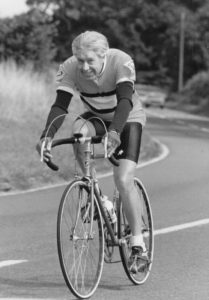
Road Racing again saw John Withey to the fore. By the end of March he had two 7th placings, one 2nd and his first win. These were closely followed by three more winning rides: the club’s Open 56-mile road race, the Wally Gimber race at Crystal Palace and the Antelope’s 50-mile event in Hampshire. Withey was again invited to ride in a 2-day race in Germany where he finished 48th. Andrew Sellar had a couple of wins and he and brother Angus were frequently placed riders. The club’s fastest junior on the circuits was Mark Davidson-Wright. Sadly, for the club, Withey resigned his first claim membership at the year end.
Paul Tunnell rode cyclocross events and made an attempt at the notorious Three Peaks race over Ingleborough, Whernside and Pen-y-Ghent.
In 1981 Phil O’Connor had written a most interesting account of a cycling expedition he and Mark Rayward made to see the Tour de France. In the Alps he commented that he “took some snaps”. On returning home he submitted his pictures to Pro News and had one accepted. A year on and another interesting article by him relates his experience in Belgium at the Ghent Six where he was Cycling’s official photographer! This was the beginning of a long career, photographing cyclists from every conceivable angle and interviewing and photographing many of the world’s most famous riders.
If 1982 had been rather low-key for the club, 1983 was to prove even worse with membership at the beginning of the year standing at just seventy-nine. Reports on road and track racing and cyclocross are virtually non-existent. On the time trialling scene, Steve Davies continued to improve at all distances except 25 miles, Joyce Smith had her best season for years, Sid Honeyball finished 19th in the National Championship 24-hour with 413.2 miles.
Keith Wawman, with two 24’s and a 12 behind him, rode the famous Paris-Brest-Paris, a distance of 1200 kms. Writing a short account of his ride in the Gazette Wawman says he was placed in the ‘medium fast’ group that started off at 10 am from Paris with 829 riders. An earlier group of some 1,000 riders had already departed at 4 am and the ‘flyers’, around 120 in number, were due to set off at 4 pm. The first control and feeding point was at 161 km where he was glad of a meal. Generally, control points were spaced about 100 km apart. He got through the first night without sleep but when he found himself dozing and running into a brick wall he stopped for ten minutes ‘shut-eye’, and then it was on to Brest. Wawman recalls that during the next two nights he had two hours’ sleep and a much needed 2.5 hours stop for a slap-up meal when 80 km short of Paris.
In summing up, he reckoned he had a total of 4.5 hours sleep over the 3.5 days that it took to cover the 1200 km and that he spent about £50 on ‘fuel’, i.e. food and drink. It was on this ride he encountered his first recumbent cycle and could not imagine how the cyclist could find it comfortable.
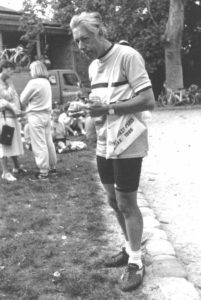
Since the Fountain C.C. folded Arthur Rayner has given considerable financial support to the club by donations and providing awards for the Open time trials. The membership was pleased to thank him in the only way they felt able and elected him as a Life Member in 1983.
The Addiscombe was sad to record the death of three of the club’s stalwarts, Stan Roach and Percy Huggett, both founder members who had worked tirelessly in various capacities over many years, and Molly Huggett whose hospitality and cakes were legendary. That all three would be missed was borne out by the tributes paid to them through the pages of the magazine.
With membership only slightly up in 1984 just a dozen members competed in Open time trials – Ron Breeze, Dave Bull, Steve Davies, Sid Honeyball, Gerry Marks, Ron Rand, Joyce Smith, Jim Trenowden, Paul Tunnell, Keith Wawman, Marc White, with Phil O’Connor in mid-October riding his only event of the season on a borrowed bike with an 88 inch fixed gear to record the fastest 25 of the club’s year, 59.44. In the Moon Trophy 25 earlier in the year, Marc White had claimed the award for fastest schoolboy and gone on to win the club’s evening 10-mile handicap competition. Not to be outdone, sister Michelle White, aged 11, who had been attending training sessions at Herne Hill, took 1st handicap in the President’s 10. Illness had prevented Steve Davies from riding a 12-hour event and it was left to the veterans to battle it out for the honour of becoming club champion. Despite bad weather conditions, Keith Wawman, riding in the C.C. Breckland 12-hour just managed to wrest the title from Gerry Marks.
Successful Open promotions had again been held, despite the lack of members, with S. G. Hunt, V.C. Slough winning the 10 and H. Lodge, Wessex R.C., a junior, taking the 25. The Cyclocross was run off at Shirley Hills as a counter in the London League. Phil O’Connor competed in the north country Three Peaks race. Chris Pearce, riding at Brands Hatch, and Paul Tunnell at Crystal Palace, had been our only road/circuit participants. Tunnell had also ridden in the Monday Competition at Herne Hill throughout the season.
The jumble sales, that had provided a useful revenue to club funds over the past few years, were being run by the same few and it was agreed not to hold one the following year. Joyce Smith had been the hardworking organiser, Cyril Hinton printed the posters and up to 5,000 handbills, a small team pushed these handbills through Addiscombe letterboxes, residents would phone in to say they had jumble to dispose of and Brian White would take his van round on the morning of the sale collecting, then there were usually the same few members who manned the stalls and cleared up. Another source of income was the sale of “Milk Race” tickets, a nationally run Draw where the lucky few drew a rider.
Bill Wells and Eddie Mundy were keeping the Gazette circulating but copy was hard to obtain. In addition to Keith Wawman’s Paris-Brest-Paris article, Phil O’Connor had written two interesting accounts of trips to the 1984 Tour de France travelling much of the time by bicycle with his cameras. Other stories were reminiscences of past events and Stan Harvey mentioned “an annual film show at The Jolliffe Arms, Merstham, which gave an hilarious evening to all who attended”. He failed to mention these were all-male evenings and that the photographer “did time” as a result of his film shows!
1984 was another year when the club parted company with three long-serving members: Frank Deacon, the provider of transport, giant club picnics and boating trips; then later in the year Harry Crumbley passed away, social secretary for fifteen years, fund raiser, and a good all round clubman, only to be followed by Dick Penton, a founder member and social secretary for nine years pre-war when he would organise five dances a year – the rare occasions when wives and girlfriends were in demand. All three would have been pleased to know that a slightly rejuvenated club emerged in 1985 and even though John Smith summed it up on the time trial side as “a quiet year”, it at least gave a few “regulars” a chance to get their name on a club trophy.
Club runs were taken over by Dave Willis and he immediately attempted to organise a regular Sunday run departing from Croydon town hall. A roller cycling competition for members was held over three weeks at the clubroom. John Smith was elected as President. Phil O’Connor took on the mantle of general secretary and wrote some interesting articles for the Gazette, including one, based on experience, on the hectic life of a cycle-messenger in central London. He again had a photograph accepted for the Sports Photograph of the Year exhibition. Glyn Durrant organised the purchase of new cycling kit for members, as well as proving a nifty rider in the club’s 10-mile events. And just to show members had more interests than just racing, Joyce Smith, Keith Wawman and Dave Bull individually tackled the long ride from Land’s End to John O’Groats that year, Bull’s ride being a charity fund-raising effort.
Clubroom difficulties were being encountered at the Sir Philip Games Centre and a move was made to St Martin’s church hall in Morland Road in the September.
The club had been indecisive at first about the new Surrey League but in 1985 not only affiliated but promoted two League events, the second one with 73 riders taking place on the Leatherhead section of the M25 (prior to its opening to motorised traffic). By the end of the season eight members had ridden in League races, Dave Bull and new member Chris Shearer gaining the most Addiscombe points. Shearer won a 54-mile 3rd cat. League race on the Ashdown circuit and by the end of the season had achieved 2nd cat. status and been awarded both of the club’s road race trophies. Paul Tunnell placed 4th in the Division Championship.
A new RTTC regulation required finishing sheets to be published in order of fastest time. This gave time trial promoters extra work and for a time caused a few grumbles. Now the whole result gets sorted at the touch of a computer key. Dave Bull, making a return to racing mid-season, got what appears to be the only placing by a member, 2nd in the South Eastern R.C. 25. Steve Davies, riding well, took the 25, 50 and 100 miles trophies, Keith Wawman clinched the club championship with Ron Breeze, runner-up, just getting the edge on Wawman for the 12-hour trophy, Gerry Marks won the Club Events championship and Marc White the Junior 10 trophy. The Open 10 was won by Tony Deacon, Lewes Wanderers, in 21.42, and the Open 25 by Ulrick Drake, South Eastern R.C. in 58.57 mins.
1985 was also the year Keith Wawman was awarded the coveted Golden Eagle Audax medal. For this he had to compete, and finish, in rides at distances of 200, 300, 400 and 600 kms, two at 1,000 km, plus Paris-Brest-Paris. Whereas in 1983 he had ridden the latter event on his own, in 1985 the ride was undertaken as part of a small group.
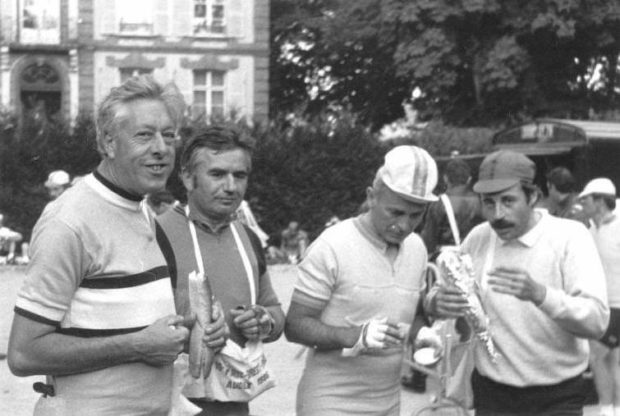
Glyn Durrant, Paul Tunnell and Mike Walklin rode cyclocross in the winter of 1985 / 86 and Tunnell promoted the usual Open event, on this occasion at Earlswood. In the South London Darts League, Pat Lacey won the final of the singles knock-out competition.
Hotels and restaurants were always changing hands or refurbishing, and an alternative venue was necessary for the Annual Dinner in 1986. Pat Mundy was able to book The Woodstock at North Cheam and although a successful dinner, members seemed reluctant to stay on for the disco dance.
Joyce Smith, this time riding with a CTC party, tackled the End-to-End route again raising £500 for St Martin’s Community Project. She recounted there had been less time to enjoy the scenery as she had covered 1,000 miles in the two weeks. The previous year, travelling on her own, she had been able to travel at a more leisurely pace, visiting interesting places en route. Keith Wawman made a total of ten trips to France during 1986, mainly riding Audax events and again completing the Paris-Brest-Paris randonee.
In accepting the annual report for 1987 it was conceded that the two years 1986 and 1987 had been “years of stagnation”. That is not to say the current membership had not been active, far from it. Although membership figures had been 77 first claim and 19 associates in 1986, dropping to 56 first claim and 14 associates the following year, a full programme of open and club events had been promoted and those that competed were as keen as ever. Glyn Durrant, through his work contacts, was able to encourage trade support in the way of prizes. Decreasing interest in conventional cycling activities and consequently, membership of clubs, had been generally felt all round, with the cycle trade also feeling the pinch.
In open time trials Austin Reid, Mike Walklin, Jim Trenowden and Joyce Smith took handicap awards and Reid scored the only event win by a club member in the Newbury Middlemarkers 25 in May 1987. Steve Davies proved the fastest overall taking the Club Time Trial Championship two years in succession. Reid, Rory Patterson and Duncan Tulip rode numerous road races, progressing with the seasons and by the end of ’87 Reid had moved up to become a 2nd category rider. Paul Tunnell and Glyn Durrant kept the Addiscombe kit conspicuous in cyclocross events and a 4-year old Mark Tunnell made his debut at Redhill C.C.’s cyclocross, taking the award for the under 12’s. Schoolgirl Michelle White rode strongly in the Monday Competition at Herne Hill and the Women’s Cycle Racing Association championship at Reading.
While it is not possible to record the passing of all members, many, like Stan Harvey, devoted much of their life to the Addiscombe. Harvey died in July 1987 having joined the club within months of its formation in 1929. John Smith in his obituary of Harvey wrote “cycling and the Addiscombe Cycling Club were his greatest loves”. Had Harvey’s wife (sister to Ernie and Wilf Mills) still been alive she would no doubt have agreed! Jim Trenowden and John Watts recall training rides Harvey took them on in the early 1950’s when if the wind was westerly they would ride to Southampton or Emsworth, returning via Arundel and Worthing, but if the wind was blowing from an easterly direction then it would be Folkestone or Hastings and along the coast to Brighton before turning for home. Harvey’s daughter Barbara arranged that a Shield in memory of her father be awarded annually at the President’s 10.
Up to this point the club had more or less followed a regular pattern even if the past few years had been low key. An annual dinner celebrated the past season’s successes, longer club / training runs, so-called “hardriders” events’ opened the new year, track racing from Easter onwards, road and circuit racing, the time trial season through to early October followed by a few hillclimbs, cyclocross and winter club runs with perhaps a free-wheel contest or speed-judging competiton thrown in for fun. Off-road riding, or “rough-stuff”, mostly on the same machine and tyres as one would use for club riding, would be part of one’s holiday riding. For example, Sid and Fred Armstrong in earlier years had used a vacation to tackle the infamous Lairig Ghru in the Cairngorm mountains. It was the development of “MTB’s” in the early 1980’s that finally opened up off-road riding as an activity separate from mainstream cycle sport.
By the end of 1987 there were signs of change in the Addiscombe. Not only were the Bayliss brothers using their cycling as a way of toughening up for triathlon events but the general secretary, Phil O’Connor, was noted using “a mountain bike” when transporting his cameras to events – and probably for his courier work in London.
In the autumn a 16-year-old turned up at the clubroom and asked if the club accepted mountain bikers. John Smith had replied in the affirmative and asked if he had any friends interested. The following week Marco Faimali, together with Ian Joseph, Andrew Ince, Vernon Ellis and Steve Thompson, arrived. Smith selflessly started taking them on club runs throughout the southeast and generally taught them how to enjoy the sport. Smith’s fortuitous decision when he invited these youngsters to join would greatly assist the Addiscombe to regain its status as one of the leading clubs south of the Thames.
- An Introduction to our History
- The 1883 Addiscombe Cycling Club
- The 1906 Addiscombe Cycling Club
- An Historical Background to the Road Record Associations
- A Brief Historical Background to Cycling Time Trials
- The Club’s Revival, 1929 to 1939
- The Club in Wartime, 1940 to 1946
- The Post-War Years, 1947 to 1957
- Post-War Track and Roller Racing
- The Men in Post-War Time Trials
- The Women in Post-War Time Trials
- Post-War Closed Circuit and Road Racing
- An Influx of New Riders and the Passing of a Statesman, 1958 to 1964
- The Club Heads Towards its Golden Jubilee, 1965 to 1978
- Membership Declines, 1979 to 1987
- The Arrival of the Young Mountain Bikers, 1988 to 1994
- Another Period of Declining Membership, 1995 to 1999
- New Century and a New Look for the Addiscombe, 2000 to 2006





